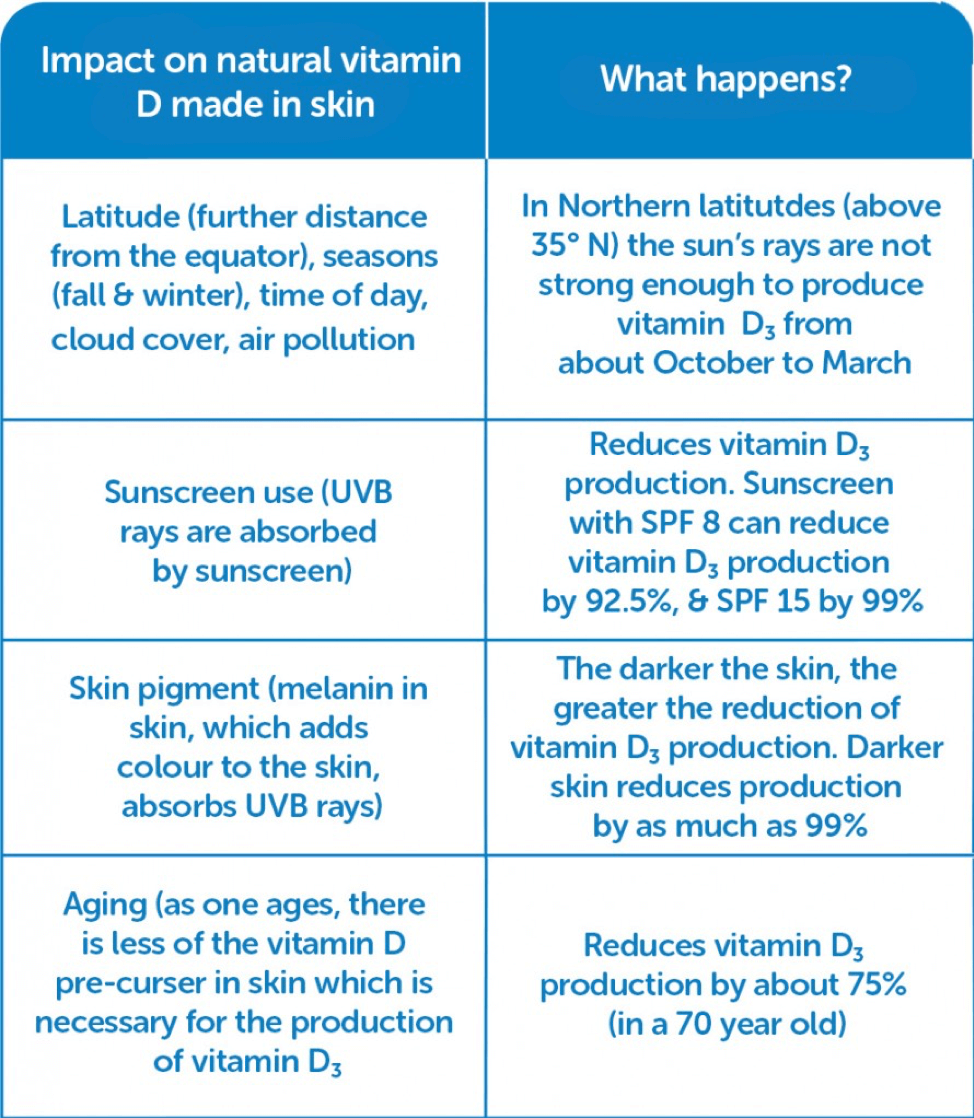Vitamin D deficiency: What factors are associated with low vitamin D?
It is not uncommon these days for their healthcare practitioner to recommend a vitamin D supplement, even though there are no signs of vitamin D deficiency.[4] Nevertheless, this gets us thinking…why? Is there a problem? Do I have vitamin D deficiency? It is always best to clarify and discuss this with your healthcare professional.
What factors are associated with low vitamin D?
Factors that influence the blood levels of vitamin D include: [1]
- Lifestyle, including a longer amount of time spent indoors. This includes people who predominantly work or study inside and those who are housebound or confined indoors for long periods
- Geographic location (further from the equator, cold, rainy, or cloudy environments)
- Sunscreen use (SPF 15 sunscreen reduces vitamin D production in the skin by 99%)
- Limited direct sun exposure, such as people who cover up their skin when outdoors, or those who seek shade from the sun
- Diet – there are few dietary sources of vitamin D (for instance: fortified milk and oily fish). Milk allergy, lactose intolerance, ovo-vegetarianism, and veganism are therefore risk factors
- Skin pigmentation (see table below)
- Age (see table below)
Influential factors related to vitamin D from sunlight and the skin
 Adapted from Holick [2]
Adapted from Holick [2]
Health issues that affect Vitamin D status
Health issues can also affect the body’s ability to absorb vitamin D, break down the pro-hormone form of vitamin D, and turn it into an active hormone. [3] These include:
- Reduced-fat absorption – common in some diseases such as:
- Cystic fibrosis
- Celiac disease,
- Whipple’s disease
- Crohn’s disease
- Other conditions like gastric bypass surgery
- Medications that reduce cholesterol absorption (anti-cholesterol medication)
- Obesity – vitamin D is taken out of circulation and stored in fat cells
- Liver disease
- Kidney disease (i.e. Nephrotic syndrome)
- Some medications such as anti-consultants taken for forms of Epilepsy, glucocorticoids, AIDS medication (HAART)
- Hereditary rickets
- Hyperthyroidism and primary hyperparathyroidism
- Some types of tumors, sarcoidosis, tuberculosis, some lymphomas
Be sure to discuss your health issues with your healthcare practitioner. They are the most familiar with your history and offer great advice.
- Vitamin D Factsheet for Health Professionals. NIH assessed Sept 2015. https://ods.od.nih.gov/factsheets/VitaminD-HealthProfessional/
- Hollick MF. Vitamin D Deficiency. N Engl J Med 2007;357;3:266-81
- Kennel et. al. Vitamin D Deficiency in Adults: When to Test and How to Treat. Mayo Clin Proc. 2010 Aug; 85(8): 752–758. http://www.ncbi.nlm.nih.gov/pmc/articles/PMC2912737/
- Kennel et. al. Vitamin D Deficiency in Adults: When to Test and How to Treat. Mayo Clin Proc. 2010 Aug; 85(8): 752–758. http://www.ncbi.nlm.nih.gov/pmc/articles/PMC2912737/


